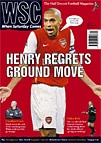 Steve Evans put Boston on the football map, but only by organising a tax fraud that almost landed him in jail – and that many fans feel should have cost him his job. Peter Brooksbank reports
Steve Evans put Boston on the football map, but only by organising a tax fraud that almost landed him in jail – and that many fans feel should have cost him his job. Peter Brooksbank reports
Moments after the end of the televised Conference-clinching win at Hayes in 2002, Boston United manager Steve Evans grinned into the Sky cameras, surrounded by champagne-soaked players and disbelieving fans. “Laps of honour are for champions,” he gloated, making reference to Dagenham boss Garry Hill, who had led his players on a premature lap of glory two months earlier. The slogan assumed instant cult status back in Boston, the club even plastering it on T-shirts in the official shop. Four years later, the phrase has a new twist on fans’ message boards: “Laps of honour are for champions, guilty pleas are for cheats.”
For Boston fans, the embarrassingly public conclusion of Evans’ trial for conspiring to defraud the public revenue was not, as they had hoped, the end of a truly surreal eight-year period of wild peaks and troughs. Although no one wished a custodial sentence upon him, the majority of fans wanted Evans out. To their dismay, and the palpable amazement of a national press pack unfamiliar with how Boston operate, chairman Jim Rodwell emerged from Southwark Crown Court to give Evans his full and absolute backing. “He deserves a second chance,” Rodwell told the journalists. “We want to judge him on results.”
Yet for most supporters the results no longer matter. It’s the principle of having a convicted fraudster and exposed cheat in the dugout they find most abhorrent. In the grand tradition of lower-league protest, the issue has caused an exodus from the terraces of York Street. One fan refusing to attend games on principle is Mick Taylor. “The actions of the manager and those of the owners are sending out the wrong messages to fans old and young,” he says. “I don’t want to associate myself and my children with a so-called community football club that seems to promote cheating.”
Mick is not alone. A number of disgruntled fans have decamped across town to watch United Counties League side Boston Town, but even there they are not immune from the antics of Evans and United’s mysterious parent company Lavaflow, of which Evans’ brother Gee is a director and Rodwell chairman.
Lavaflow are awaiting the outcome of a complicated planning application comprised of four interdependent schemes to redevelop both clubs’ grounds and relocate them. It’s an ambitious project – and extraordinarily risky. If one application fails, they all fail. Worryingly, there is no Plan B. Jon Sotnick, the man behind the controversial reappointment of Evans in 2004 and the stadium relocation plans, quit as chairman to join Darlington in June shortly after warning that the consequence of failing to get planning permission would be the certain demise of United. With a decision due in early December, the Pilgrims continue to live a day-to-day existence, begging for sponsors and exploiting the short-term and emergency loan market as best they can.
The slide into fully fledged disaster has been insidious, but sobering reminders of trouble lurk everywhere. A crucial away win at Macclesfield hauled United to within a point of safety, but any sense of relief was immediately curtailed when the BBC reported that the club were facing imminent liquidation. Rodwell denied the claims, as he has done before, but that evening the fans weren’t talking about League survival – just survival.
There are few signs of hope. The absence of an evident crisis has made life difficult for the fledgling supporters’ trust, BUFCST, to attract support. A public meeting it organised after the sentencing drew over a hundred people, but it has so far failed to convert the mounting anger into constructive efforts to safeguard the club. An emerging willingness for a fragmented fan base, split by Evans’ return, to unite in order to save the club is certainly welcome, but the nagging feeling is that it’s just too late.
The last word must go to Jim Rodwell, who broke his silence on the huge off-field problems in an interview broadcast just before the derby with Lincoln. “Well, it could be worse, we could have a bout of leprosy sweeping through the camp,” he chuckled. Just another day at Boston United.
From WSC 239 January 2007. What was happening this month